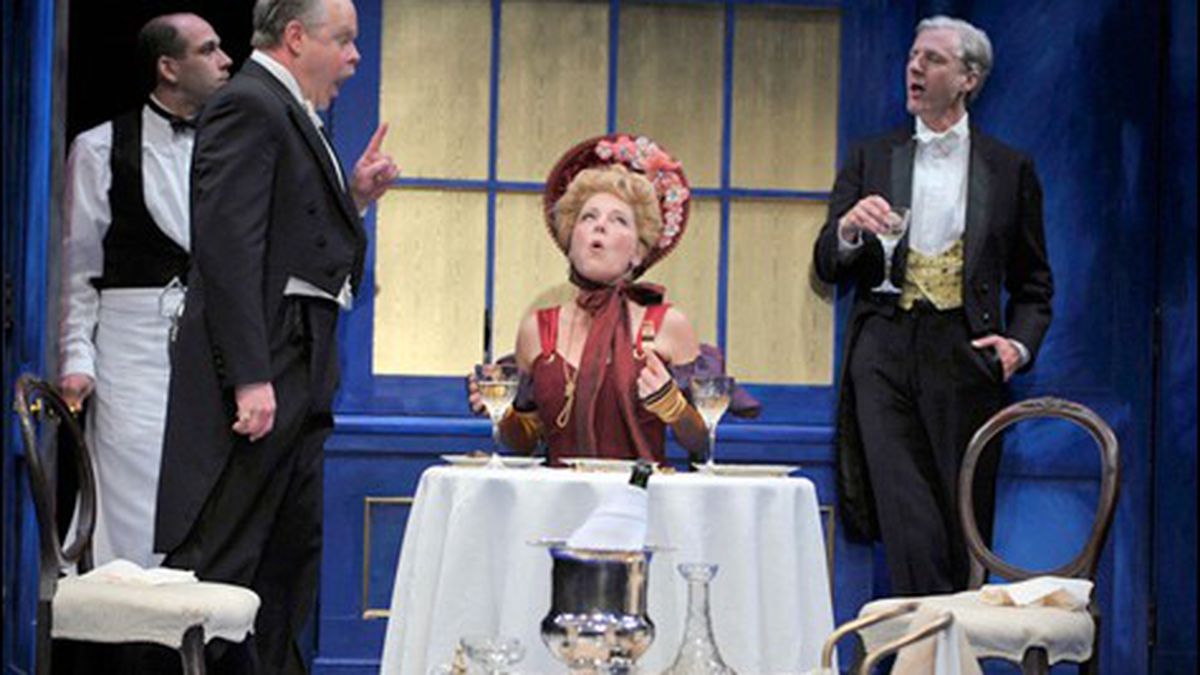Anatol is a formally adventurous sex comedy about Viennese high society at the end of the 19th century. Suffice it to say, a lot could go wrong. Aurora Theatre Company’s new production, directed by company founder Barbara Oliver, could quite easily be offensive, or unrelatable, or shallow, or, worst of all, boring — but fortunately, it’s none of these things. Or, at least, where it is, it’s on purpose.
Written by Arthur Schnitzler — a contemporary of Freud’s in the upper-class, largely Jewish milieu of 1890s Vienna — in 1893, it was immediately decried for its frank sexuality. Those depictions are, by contemporary standards, almost prudish, mostly talk and minimal action, but it’s easy to see how the play would be controversial in the midst of Britain’s Victorian era and long before sex became common artistic material. It’s centered around Anatol (played by Mike Ryan), a neurotic, well-off lothario, who, along with his best friend, comic foil, and fellow man-boy Max (Tim Kniffin), is essentially sleeping his way through Vienna’s upper crust with reckless abandon and startling efficiency. The play has no traditional three-act narrative arc, but rather consists of six barely-connected vignettes, each focusing on one of Anatol’s conquests, all of whom are played by Delia MacDougall.
It’s a setup that could easily derive its comedy at the expense of the women, but Schnitzler cleverly avoids this by finding humor in everyone. That is, Anatol’s women are, at turns, deceitful, irrational, jealous, stuck-up, shallow, and stupid — but so is he, usually more so. Some of the play’s promotional materials call him a Casanova, but that’s not quite it: He’s more like a serial nonmonogamist, or an incorrigible infatuation junkie, or even a hapless (if superficial) romantic, forever falling deeply and irreversibly in love — until the next girl comes along. His affairs are acutely meaningful, even though they’re ultimately meaningless: He hangs onto dead flowers and locks of hair as mementos; enjoys the chase with believable sincerity, though he quickly loses interest shortly thereafter; and feels passionately for the women he sleeps with, even if he can’t always remember their names. Anatol is not a player, he just crushes a lot.
Don’t get me wrong: Dude’s despicable. At one point in the play, he leaves a hysterical and heartbroken one-night-stand in his house because he has to go get married. At another, he sustains an entire two weeks having one dinner a night with one woman, and then leaving her to do the same with another. He’s unbelievably hypocritical, always expecting his women to remain faithful as he is not, and he’s a terrible liar — which is unfortunate because he’s always lying. But Ryan plays him with a charming naïveté, one that works well against the sparkling, slow-burning wit MacDougall manages to inject into all of her characters, even the ostensibly dumb ones. The biggest chunk of Anatol‘s humor comes from the misunderstanding and dramatic irony engendered by that tension: Throughout the play, even as Anatol continues to consider himself irresistible, it’s often the women who end up on top (so to speak).
That’s what the play’s really about, after all: the subjective mutability of reality; the way two people can have completely different views of the same situation; the lies we tell ourselves and others before, during, and after sex; the meaninglessness with which many people go through the world. And, in that sense, it’s timeless. The script — a world-premiere translation by Margaret Schaefer — does a fantastic job of subtly updating the language in a way that sounds natural and not overly slangy, but it’s the universal themes and the straightforward comedy that make the play feel so thoroughly modern. Change some details and it could easily be a Woody Allen-esque romantic comedy set among New York City’s disaffected bourgeoisie of the Seventies. Change them in a different way, and it could be a Bret Easton Ellis novel about a nihilistic rich boy and his many conquests. Hell, some of the broader passages could neatly be folded into an American sitcom like Friends, funny-but-ultimately-insubstantial as they are. And in a 2002 New Yorker piece, Leo Carey writes of one of Schnitzler’s later pieces, a novel, “If The Road Into the Open were set thirty years later and in Paris, much of it could pass for a work of French existentialism.” The same could be said for Anatol: All the characters are ultimately insubstantial, their exploits presented episodically and without any real storyline — and that’s precisely the point.
At the end of the play, there’s no big denouement, none of the radical character transformation you might expect from a play centered around such an unlikable character. Anatol is not redeemed in the end: He finishes the play exactly who he was in the very first scene, no more or less complex than he ever appeared to be. For some people, this — the lack of a single empathetic character, the seeming inertness, the no-ending ending — might be disappointing. For others, it’ll feel perfectly satisfying in its unsatisfyingness. Like everything about Anatol, it’s all about how you look at it.

















